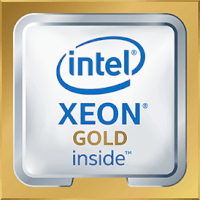
Il processore Intel Xeon Gold 5120 è sviluppato sul nodo tecnologico 14 nm Skylake . La sua velocità di clock di base è 2.20 GHz e la velocità di clock massima in turbo boost è 2.60 GHz . Intel Xeon Gold 5120 contiene 14 core di elaborazione. Per fare la scelta giusta per l'aggiornamento del computer, familiarizzare con le specifiche tecniche dettagliate e i risultati dei benchmark. Verificare la compatibilità del socket prima di scegliere.
 Core della CPU e frequenza di base Core della CPU e frequenza di base |
||||
|---|---|---|---|---|
| Frequenza | 2.20 GHz | Core | 14 | |
| Turbo (1 nucleo) | 3.20 GHz | Thread della CPU | 28 | |
| Turbo (tutti i core) | 2.60 GHz | |||
| Hyperthreading? | sì | Overclock? | No | |
| Architettura di base | normal | |||
 Grafica interna Grafica interna |
|
|---|---|
| Nome GPU | no iGPU |
| GPU frequency | |
| GPU (Turbo) | No turbo |
| Generation | |
| Versione DirectX | |
| Execution units | |
| Shader | |
| massimo Memoria | -- |
| massimo mostra | |
| Tecnologia | 14 nm |
| Data di rilascio | |
 Supporto codec hardware Supporto codec hardware
|
|
|---|---|
| H264 | No |
| H265 / HEVC (8 bit) | No |
| H265 / HEVC (10 bit) | No |
| VP8 | No |
| VP9 | No |
| AV1 | No |
| AV1 | No |
| AVC | No |
| JPEG | No |
 Memoria e PCIe Memoria e PCIe
| ||||
|---|---|---|---|---|
| Tipo di memoria | DDR4-2400 | |||
| massimo Memoria | ||||
| Canali di memoria | 6 | ECC | Yes | |
| Versione PCIe | 3.0 | PCIe lanes | 48 | |
 Gestione termica Gestione termica
| ||||
|---|---|---|---|---|
| TDP (PL1) | 105 W | TDP (PL2) | ||
| TDP up | -- | TDP down | -- | |
| Tjunction max | -- | |||
 Dettagli tecnici Dettagli tecnici
| |
|---|---|
| Instruction set (ISA) | x86-64 (64 bit) |
| Architettura | Skylake |
| L2-Cache | -- |
| L3-Cache | 19.00 MB |
| Tecnologia | 14 nm |
| Virtualizzazione | VT-x, VT-x EPT, VT-d |
| Data di rilascio | Q3/2017 |
| Socket | LGA 3647 |
Cinebench R20 è il successore di Cinebench R15 e si basa anche su Cinema 4 Suite. Cinema 4 è un software utilizzato in tutto il mondo per creare forme 3D. Il test single-core utilizza solo un core della CPU, la quantità di core o la capacità di hyperthreading non conta.
Cinebench R20 è il successore di Cinebench R15 e si basa anche su Cinema 4 Suite. Cinema 4 è un software utilizzato in tutto il mondo per creare forme 3D. Il test multi-core coinvolge tutti i core della CPU e trae un grande vantaggio dall'hyperthreading.
Alcune delle CPU elencate di seguito sono state sottoposte a benchmark da CPU-Benchmark. Tuttavia, la maggior parte delle CPU non è stata testata e i risultati sono stati stimati da una formula proprietaria segreta di CPU-Benchmark. In quanto tali, non riflettono accuratamente i valori effettivi del marchio Passmark CPU e non sono approvati da PassMark Software Pty Ltd.
Cinebench R15 è il successore di Cinebench 11.5 ed è anch'esso basato su Cinema 4 Suite. Cinema 4 è un software utilizzato in tutto il mondo per creare forme 3D. Il test single-core utilizza solo un core della CPU, la quantità di core o la capacità di hyperthreading non conta.
Cinebench R15 è il successore di Cinebench 11.5 ed è anch'esso basato su Cinema 4 Suite. Cinema 4 è un software utilizzato in tutto il mondo per creare forme 3D. Il test multi-core coinvolge tutti i core della CPU e trae un grande vantaggio dall'hyperthreading.
Geekbench 3 è un benchmark multipiattaforma che utilizza pesantemente la memoria di sistema. Una memoria veloce spingerà molto il risultato. Il test single-core utilizza solo un core della CPU, la quantità di core o la capacità di hyperthreading non conta.
Geekbench 3 è un benchmark multipiattaforma che utilizza pesantemente la memoria di sistema. Una memoria veloce spingerà molto il risultato. Il test multi-core coinvolge tutti i core della CPU e trae un grande vantaggio dall'hyperthreading.
Cinebench 11.5 è basato su Cinema 4D Suite, un software popolare per generare moduli e altre cose in 3D. Il test single-core utilizza solo un core della CPU, la quantità di core o la capacità di hyperthreading non conta.
Cinebench 11.5 è basato su Cinema 4D Suite, un software popolare per generare moduli e altre cose in 3D. Il test multi-core coinvolge tutti i core della CPU e trae un grande vantaggio dall'hyperthreading.